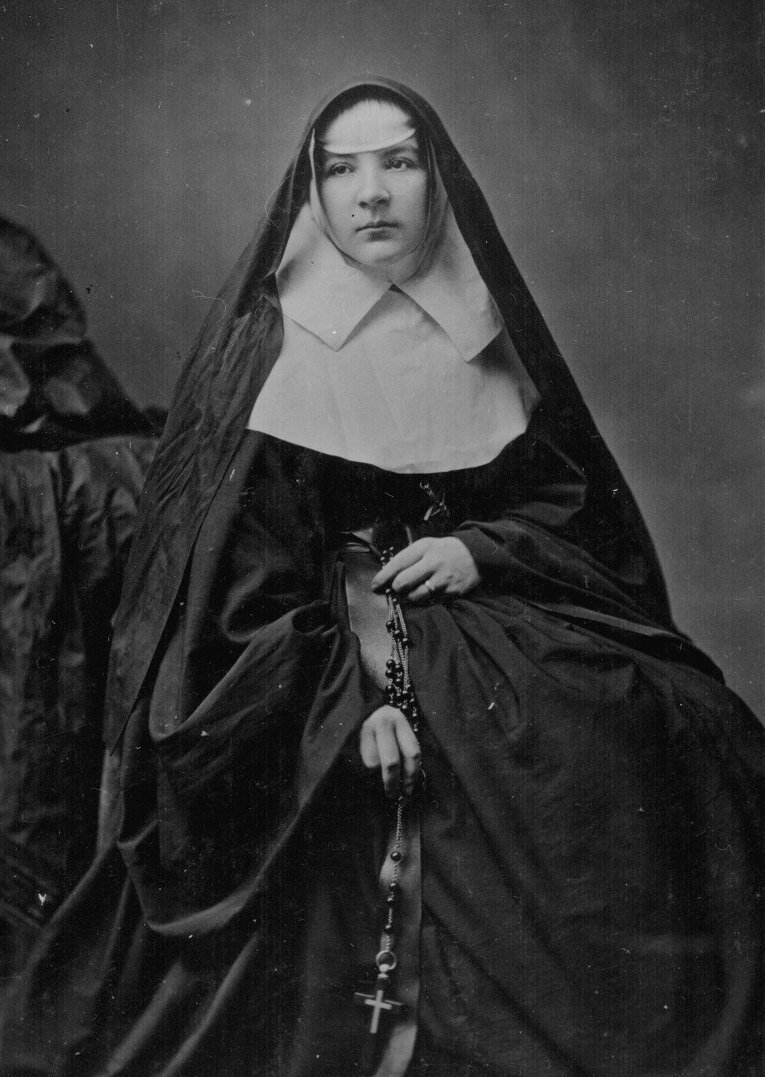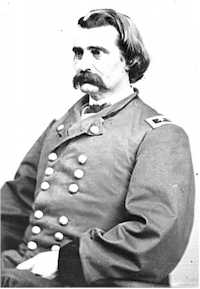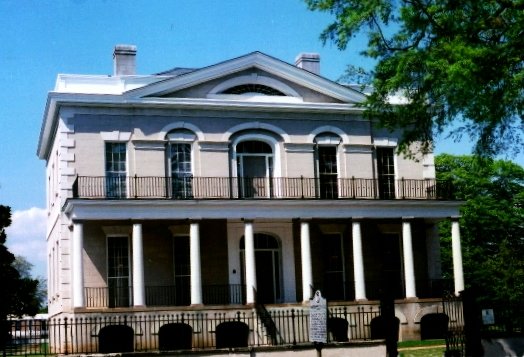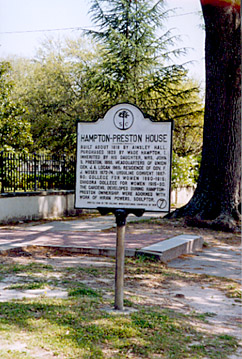Ursuline Mother Superior
Sister Baptista Lynch
Saves the Hampton House

The Ursuline Convent School for Girls was located on Southeast corner of Blanding and Main Streets in what was once a 70-room hotel. Durning the "Burning of Columbia" in February of 1865, everything between it and the State House was destroyed in the fire.
It housed 200 students who paid $220 per month for room and board, washing, lights, fuel and English instruction. Extra fees were charged for foreign languages, singing, piano, harp and guitar lessons, as well as for art and embroidery classes.
|

Ellen Sherman |
|
On the morning of February 17, Sherman received a note from Mother Superior Baptista Lynch who, while asking for special protection for her school and pupils, reminded the general that she had once taught his daughter Minnie at a convent in Ohio. William T. Sherman feared few things in life, but the wrath of his wife, Ellen, a devout Catholic, was one of them.
Thus, while Sherman and his men earned a reputation of destruction during the March to the Sea and the subsequent trek through the Carolinas, little harm befell Catholic property. (This is the main reason Trinity Episcopal Cathedral was spared. It was mistaken for a Roman Catholic Church.) He had mentioned that his army contemplated no destruction of any private property in Columbia at all,” but to be on the safe side, he ordered his inspector general, Colonel Charles Ewing, Ellen’s brother, to “See this woman [the Mother Superior] and tell her we’ll destroy no private property.”
|
That night Mother Baptista discovered that Sherman could not keep his promise. At 11:00 a.m. she had been warned by a Federal major who was a Catholic soldier from Detroit, “that she would need all the guard he had brought, as Columbia is a doomed city; at least that is the talk of the Army; and I do not know if a house will be left standing.” At nightfall the Mother Superior soon realized her plight. She had the girls gather warm clothing and whatever possessions they could carry and met them in the chapel. As Father Lawrence P. O’Connel performed a benediction, drunken soldiers burst into the chapel and stole the golden objects from the altar. Mother Baptista marched her charges three blocks to St. Peter’s Catholic Church. Father O’Connell led the group, defiantly holding a crucifix above his head. Remarkably, they made it to the church without any serious incident. There they were assisted by two Irish Catholic Union officers, who helped keep watch over the church and the young girls. Unfortunately, a number of soldiers had followed Father O’Connell’s group and were now trying to burn down St. Peter’s, forcing the girls to seek safety in the church cemetery, where they spent a cold, terrifying night. Miraculously, the church survived, thanks to the faithful guard. The Mother Superior and her charges, however, had to listen to taunts from drunken soldiers who reportedly cried out, “we’re just as holy as you are!. . .Now what do you think of God? Ain’t Sherman greater?”
The next morning Sherman met Mother Baptista at St. Peter’s. Local resident Sara Aldrich Richardson witnessed the meeting: “General Sherman began explaining how the fire got beyond his control from buildings he had to burn, and blamed our men [Confederates] for leaving liquor in the city, etc.” After further ramblings about “patience and Christian endurance,” the Mother Superior glared at him and said, “General, this is how you keep your promise to me, a cloistered nun?” Sherman responded by offering her “any of the houses ‘left standing’ as a gift.” The nun replied, “General Sherman, I do not think the houses left are yours to give, but when I do make arrangements for my community and pupils, I will thank you to move us and provide food for the large numbers it will be hard to feed.”
Shortly after the tense meeting between Sherman and Mother Baptista, Miss Richardson and one of the sisters heard of plans to burn the Preston Mansion when the Federals departed Columbia. Though the Hamptons and Prestons were not Catholic, they had been friends of the nuns and the school. When the Mother Superior heard the news she responded, “This cannot be permitted.” Remembering Sherman’s offer of any of the houses “left standing,” in a note to the general she asked for the Preston home. Colonel Ewing responded to the request and asked the mother superior if she knew the Preston house was General Logan'’ headquarters. She Said, ‘Yes; but General Sherman offered me any house I wished, and this one suits me better than any other.’ Col. Ewing replied, ‘Well, I have come to move you; but that house, I know, has been ordered to be burned tomorrow morning when the army leaves; but if you will take it for a convent, I will ask the general to countermand the order.’ This was done.”
Shortly after the tense meeting between Sherman and Mother Baptista, Miss Richardson and one of the sisters heard of plans to burn the Preston Mansion when the Federals departed Columbia. Though the Hamptons and Prestons were not Catholic, they had been friends of the nuns and the school. When the Mother Superior heard the news she responded, “This cannot be permitted.
Remembering Sherman’s offer of any of the houses “left standing,” in a note to the general she asked for the Preston home. Colonel Ewing responded to the request and asked the mother superior if she knew the Preston house was General Logan'’ headquarters. She Said, ‘Yes; but General Sherman offered me any house I wished, and this one suits me better than any other.’ Col. Ewing replied, ‘Well, I have come to move you; but that house, I know, has been ordered to be burned tomorrow morning when the army leaves; but if you will take it for a convent, I will ask the general to countermand the order.’ This was done.”
Mother Baptista went straight to Logan, who reportedly had barrels of pitch in the cellar and bundles of straw around the outsides. He did not believe her until she showed him the orders and the title that Sherman had issued for it. The angry Logan allegedly “swore mightily,” then ordered the combustibles removed, though he did issue orders to torch the house if the Sisters did not occupy it before they left.
| |

"Black Jack" Logan |
|
Mother Baptista went straight to Logan, who reportedly had barrels of pitch in the cellar and bundles of straw around the outsides. He did not believe her until she showed him the orders and the title that Sherman had issued for it. General (Black Jack) Logan, was known to feel that the southern aristocracy was responsible for the war and should therefore be singled out for revenge was looking forward to burning Gen. Wade Hampton's ancestral home. The angry Logan allegedly “swore mightily,” then ordered the combustibles removed, though he did issue orders to torch the house if the Sisters did not occupy it before they left.
The Sisters were also given ten days’ worth of meat, sugar, coffee, tea, and flour and hardtack. In May 1865 they returned the house to the Prestons.

Hampton-Preston House |

Historical Marker |

Senator C. L. Blease |
(In the 1920s and 30s, U. S. Senator Cole Blease from South Carolina tried three times to get Congress to pay the convent $112,538 in damages ($60,000 of which went for the cost of the building), citing Sherman’s “broken promise.” Though he entered 45 pages of testimony into the Congressional Record, his efforts failed.)
HOME
About SCV -
Join SCV -
Legionary -
Co. News -
Member Services -
Education
B.F.C. -
Ancestors -
Memorials -
Links -
Photo Gallery -
Guest Book -
Site Index





